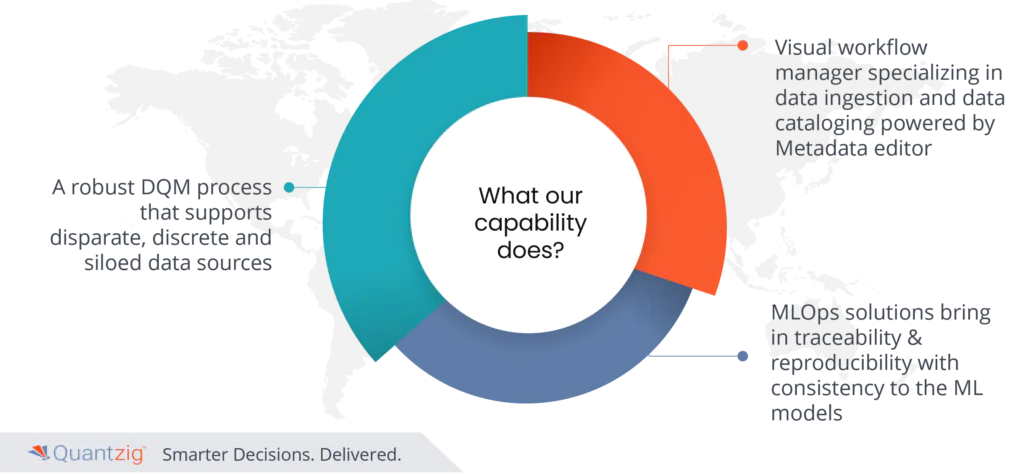Table of Contents
Introduction
In the dynamic landscape of modern business, the integration of Artificial Intelligence (AI) has become not just a strategic advantage but a necessity for staying competitive. Yet, amid the promise of AI’s transformative power, many organizations encounter significant roadblocks along the way. These roadblocks, collectively known as MLOps (machine learning operations) challenges, have the potential to hinder and even derail your business AI journey. In this article, we’ll explore these formidable hurdles, dissecting their intricacies and, more importantly, providing actionable solutions. Join us as we navigate the intricate terrain of MLOps roadblocks, guiding you toward a successful and seamless integration of AI into your business operations.
Importance of a systematic and streamlined machine learning operations process:
Firstly, a robust mlops process demands high-quality data streams and effective data cataloging. High-quality data serves as the lifeblood of AI and ML models. Without it, the accuracy and reliability of these models are compromised. Effective data cataloging ensures that data is well-organized, documented, and easily accessible. This not only facilitates model training but also future proofs against contingencies. In a rapidly evolving data landscape, having a well-structured data catalog allows businesses to adapt to new data sources and requirements efficiently. It minimizes the risk of data becoming obsolete or unmanageable over time, especially in the face of unexpected changes or exemptions.
Secondly, introducing AI/ML models into business-critical processes necessitates audit trails, reproducibility, and explainability. Audit trails provide a detailed record of how a model was trained and deployed, which is vital for compliance, accountability, and debugging. Reproducibility ensures that the model’s results can be replicated consistently, enabling verification and validation. Explainability, on the other hand, is crucial for transparency and trust. It allows stakeholders to understand why a model makes specific decisions, particularly in sensitive areas like finance or healthcare. These measures collectively ensure that AI/ML models can be seamlessly integrated into critical processes, minimizing risks, and maximizing their value to the business.
Challenges/Problems faced while implementing machine learning operations:
In practical scenarios, data often originates from diverse sources, each with its unique set of variances and issues. Attempting to address these challenges at the destination, such as during data processing or model training, can be exceedingly complex and risky. Filtering data at the source, while feasible in some cases, may not always be practical, especially when dealing with external or third-party data providers.
To ensure the ethical use of AI and the humanization of solutions, it is imperative that data processing and modeling practices are designed to be non-discriminatory. This means that AI systems should not unfairly favor or disadvantage any group or demographic. Moreover, decisions made by AI models should be consistently reproducible to maintain traceability and compliance with regulatory requirements.
By addressing data quality and fairness concerns at multiple stages of the AI pipeline, including data collection, preprocessing, and model development, organizations can mitigate biases, enhance transparency, and uphold ethical standards. This approach not only fosters trust in AI-driven solutions but also aligns with the imperative of responsible AI deployment in today’s data-driven world.
Benefits of identifying MLOps Roadblocks:
Streamlined and consistent data and decisions across AI models are essential for facilitating business adoption, particularly in critical processes that heavily rely on human intervention and manual labor. When AI-driven models produce reliable and uniform results, it instills confidence among human operators and decision-makers. This consistency reduces resistance to change and encourages the integration of AI solutions into traditionally human-reliant processes. It also leads to efficiency gains, as human operators can rely on AI-generated insights, which are consistent and readily available, ultimately driving productivity and enhancing the overall effectiveness of critical business operations.
What our capability does:

- Our specialized visual workflow manager, equipped with a powerful Metadata editor, empowers organizations to establish a resilient Data Quality Management (DQM) process. It excels in data ingestion and cataloging, making it possible to efficiently manage diverse, discreet, and siloed data sources. This streamlined approach simplifies the mapping, extraction, and consolidation of data from various origins, while the Metadata editor enriches data with essential context. This synergy not only optimizes data operations but also enhances data quality and governance, enabling organizations to harness the full potential of their data assets in an era of complex and disparate data sources.
- Our mlops solution ensures robust traceability, reproducibility, and consistency in machine learning operations. By establishing a continuous audit trail, we enable meticulous tracking of the model’s lifecycle, fostering transparency and accountability. Our exceptional management capabilities swiftly address anomalies, maintaining model performance. Process governance ensures adherence to workflows and best practices, ensuring model reliability. Moreover, our mlops framework solutions prioritize compliance, ensuring models meet stringent regulatory standards. This comprehensive approach elevates operational machine learning management, bolstering trust and efficiency in AI-driven processes.
Why should a client opt for our offering?
1. Prebuilt solutions expedite the integration of AI/ML models into everyday business operations and critical processes. They offer a swift and streamlined path, ensuring a seamless transition. By leveraging these solutions, organizations can avoid the complexities of building models from scratch, accelerating time-to-market. This rapid operationalization allows for the efficient incorporation of AI/ML capabilities into routine business activities, promoting agility and competitiveness. It facilitates smooth and efficient adoption, enabling businesses to harness the benefits of AI/ML technologies at a faster pace, ultimately driving innovation and success in their operations.
2. Our solutions play a pivotal role in humanizing AI, fostering trust and reliability while expediting the adoption of AI use cases. By focusing on user-friendly interfaces, explainable AI, and ethical considerations, we bridge the gap between technology and human users. This approach enhances transparency, making AI-driven decisions comprehensible and trustworthy. As a result, organizations and users are more inclined to embrace AI solutions, confident in their reliability and ethical foundations. This accelerated adoption paves the way for the effective deployment of AI across various applications, unlocking its full potential to drive innovation and efficiency in business processes.
Conclusion:
In the dynamic pursuit of AI-driven excellence, MLOps roadblocks stand as formidable challenges, threatening to derail the path to innovation. Yet, within these obstacles lie the seeds of ingenuity, ready to blossom into solutions that pave the way for triumphant AI journeys. By acknowledging, addressing, and conquering these roadblocks, businesses can harness the true potential of AI. With a commitment to data quality, transparency, and ethical deployment, they can overcome these challenges, ensuring a brighter future where AI empowers, rather than hinders, business success. Embrace these solutions and let your AI journey illuminate the path to unparalleled achievement.


